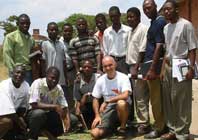

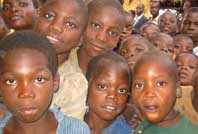
me so welcome and important, they were treating me like if I was the prime minister (of France not Australia) shaking hundred of hands, in every village I was always the guest of honour. I learned so much from my visit. It was good to see how the money is spent and yes, it makes a big difference to the people and the children. Thank you to Ausward and his team for taking the time to show me around.
Friday 22 Nov.
I left the camp quite late, 11am and rode the 400km to Nkhata Bay, which is
one of the most scenic lakeshore towns in Malawi. The last 20km were a paradise
for bike riding, hardly any traffic and plenty of fast bends going up and
down toward the shore of the lake. There are always hundred of people walking
along the road and most of them wave at me when I go pass. The difference
between Africa and other third world countries is that everyone walks instead
of cycling or taking local public transport as they do in Asia or South America.
I decided to spent a couple of day here, I found a small bungalow in a place
called Mayoka Village, over looking the lake for less than US$4 per day, perfect
place to relax, enjoy the sunshine and the tranquillity of the surrounding.
Monday 25 Nov.
Back to work, it was hard to leave Mayoka, everyone was so friendly there,
but I have a long road in front of me. I thought of stopping in Livingstonia,
another small village on the shore of Lake Malawi but I missed the turn off
so I kept going to Karonga, the last town in Malawi before Tanzania, I decided
to spend the night there.
Next is Tanzania, I am a little ahead of schedule but I know that the roads
further up are not as easy as the ones in Southern Africa so at least I will
have some time up my sleeves.
Coming up next: The Kilimanjaro, my first crash and much more.......
Click here for more photos.
La Malawie n'était pas prévu
sur mon itineraire mais on m'en a dit beaucoup de bien donc, comme c'était
un peu sur mon chemin, j'ai décidé de traverser ce pays juste
pour voir si c'était vrai.
La Malawie compte plus de 10 million d'habitants et le lac Malawi s'étend
sur plus de 500km et prend un-cinquième du territoire. Bien que le
lac apparait trés propre avec de l'eau trés claire, la bilharzia,
maladie trés sérieuse et fatale si pas soignée, infect
ces eaux, donc pas question pour moi de prendre des risques en me baignant.
Lilongwe est la capitale, une ville relaxante avec 440,000 habitants.
Mardi 19 nov.-02
Encor une fois le passage de la frontiere se déroula sans aucun problème
et à seulement 120km de Lilongwe la journée s'annonçait
plutot bien jusqu'à ce qu'un barrage de police m'arrêta quelques
80km plus loing.
En général, la police m'arrête juste par curiosité
ou pour échanger quelques mots amicalement, mais ce jour là
c'est autre chose. Ils me demandent d'abord mon permis de conduire international
que je leur montre, ensuite, c'est l'assurance de la moto qu'ils veulent voir.
En général, on paye l'assurance quand on traverse la frontiere,
j'avais bien payé quelques choses à la frontiere mais quand
je leur ai fait voir le reçu ils m'ont dit que ce n'était pas
ça, je roulais donc sans assurance, une offence apparament trés
sérieuse en Malawie puisqu'ils me demandaient 40 dollars d'amende.
J' avais beau leur expliquer que je pensais vraiment que j'avais une assurance
mais ils ne voulaient rien savoir et insistaient que je paye l'amende. Ils
n'en été pas question, la plupard du temps ils mettent l'argent
dans leurs poches ce qui encourage la corruption. Aprés une longue
discussion, toujours poliment bien sur, car ce mettre en colère ne
ferait qu'agraver la situation, ils me laisserent partir sous condition que
je retourne à la frontiere acheter l'assurance. C'est pourquoi les
120km sont devenus 280 furieux kilomêtres et quand j'ai repassé
l'endroit ou ils m'avaient arrêtés, il n'y avait aucune trace
d'eux.
Je plantais la tente à Lilongwe en fin d'aprés midi.
Le lendemain je me rendais à World Vision ou l'on organisait une visite
d'un de leur projet supportés par World Vision Australie.
Jeudi 21 Nov.
World Vision assistent 47,000 enfants, leurs familles et leurs communitées,
en construissant des écoles et des centres de soins, en améliorant
leurs points d'eau et leurs éducation sanitaire.
Aujourd'hui je vais visiter Kafulu, une région à une centaine
de km de Lilongwe dont les derniers 30km accéssible par un chemin.
Je suis parti à 8 heures en compagnie d'un responsable du projet et
nous avons passés la journée à visiter différent
programme. D'abord, le croisage des chèvres, en effet, pour améliorer
la qualitée de la viande et aussi le rendement du lait, ils croisent
leurs chèvres locales avec une autre race.
Ensuite, c'était l'école pour adulte que nous visitions, j'étais
accueilli par un groupe de femme qui dansaient et chantaient. En 1995, quand
World Vision ont commencés ce projet, plus de 51% etaient illétrés,
maintenant, grace à 16 centres, le pourcentage est descendu à
24%.
Avant que W V arrive, beaucoup d'enfants mouraient à la naissance,
due à un manque de médication, de personnel qualifié
et d'hygiène, maintenant, grace à l'éducation de sage
femmes locales, le niveau de mortalitée a beaucoup baissée.
La construction de 6 nouvelles écoles dans la région ont améliorés
l'attendance et aussi le niveau de l'éducation primaire et secondaire
des enfants.
Nous avons terminés en visitant un champ de cassava. Le cassava est
une plante riche en vitamines A, la racine est mangée aussi. Il a été
introduit en Malawie pour sa qualitée de pousser dans des endroits
trés sec, donc idéal en cas de séchereusse.
J'ai passé une journée superbe, les gens m'ont accueillis trés
chaudement, comme une personne importante, serrant la main à des centaine
de personnes, l'invité d'honneur dans chaque village. J'ai appris beaucoup
de chose aujourd'hui et de voir comment l'argent des dons est dépensé
est trés encourageant et tout ça grace à votre générositée
et aussi à World vision.
Je tiens à remercier Ausward Zidana (programme coordinateur) son équipe,
pour avoir pris le temps de me faire découvrir Kafulu.
Vendredi 22 nov.
Je suis parti du camp assez tard, 11 heures et j'ai parcouru les 400km jusqu'à
Nkhata bay, qui est un des plus beau village sur les bord du lac, en quelques
heures, les derniers 30km étaient idéal en moto, une route sinueuse,
sans circulation. Il y a toujours beaucoup de gens sur le bord des routes
et tous ne manque pas de me faire un signe de la main quand je les passe.
J'ai passé 3 jours trés agréable dans un petit bungalow
avec vu sur le lac, le soleil était au rendez-vous et j'ai pu souffler
un peu. C'est rare de trouver des endroits comme celui-là donc quand
on en trouve un c'est important d'en profiter au maximum.
Lundi 25 nov.-02
Reprise du travail difficile ce matin là, c'était tellement
chouette comme endroit mais j'ai une longue route devant moi et pas trop de
temps à perdre car les choses vont bientôt se compliqués
avec les pays comme l'Ethiopie et le Sudan à traverser.
J'avais pensé faire une halte à Livingstonia pour la nuit, un
autre petit village sur le bord du lac mais comme j'ai raté la bifurcation
pour y aller, j'ai décidé de continuer jusqu'à Karonga,
la derniere petite ville avant la Tanzanie.
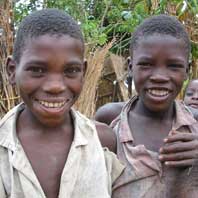
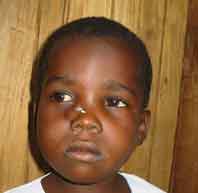
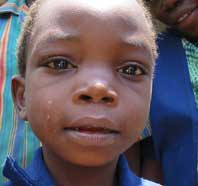
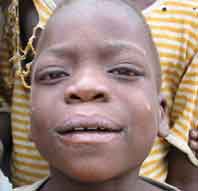
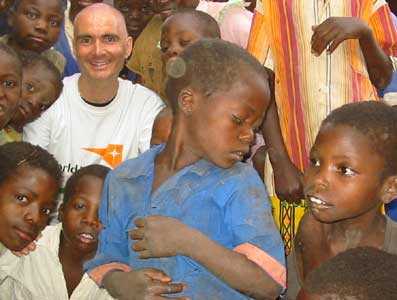
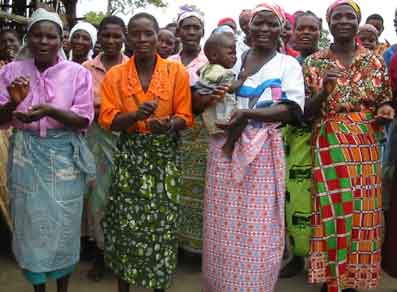
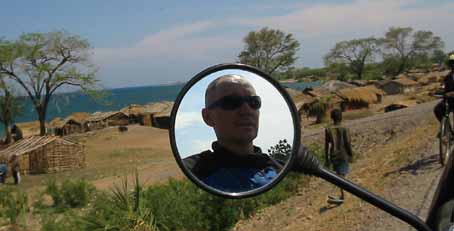
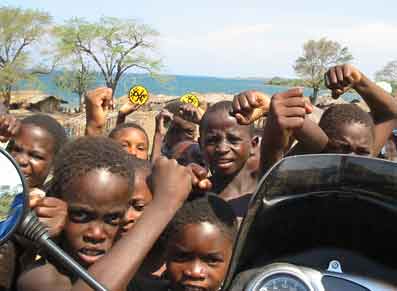
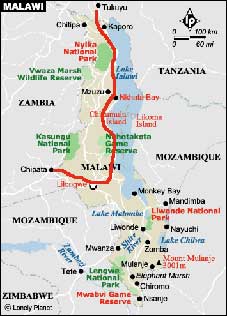
 |
 |
 |
 |
 |
 |
 |
 |
 |
 |
 |
 |
||||||||
|
|||||||||||||||||||